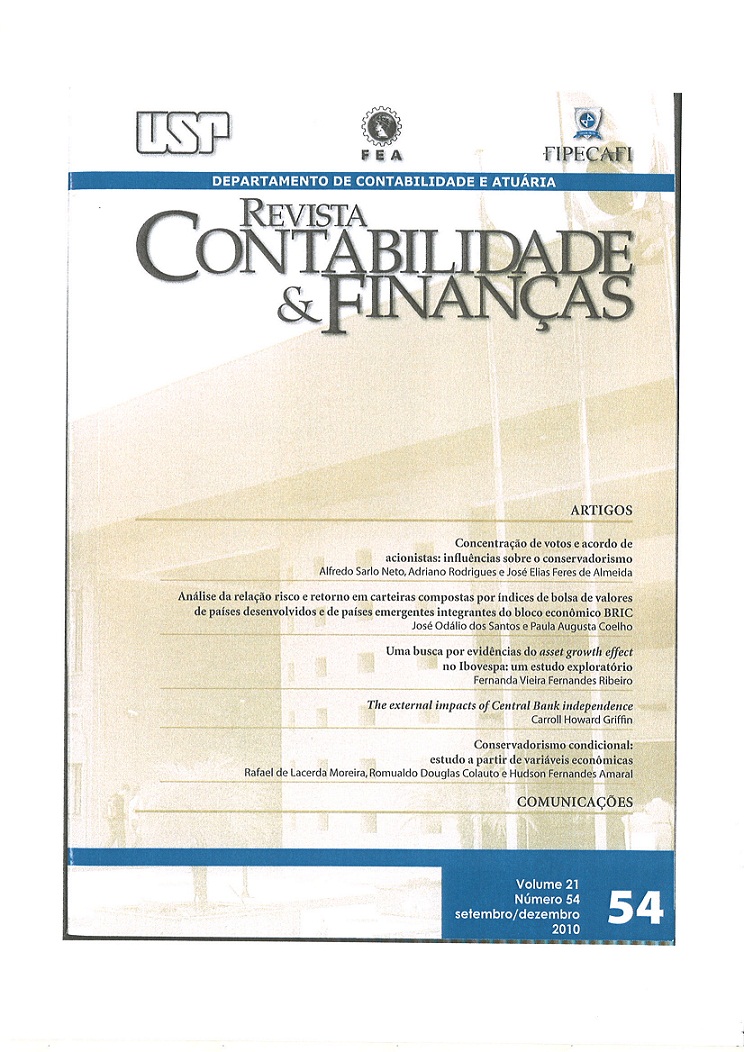Conservadorismo condicional: estudo a partir de variáveis econômicas
DOI:
https://doi.org/10.1590/S1519-70772010000300006Palavras-chave:
Conservadorismo, Qualidade do lucro contábil, AccrualsResumo
A Contabilidade, na perspectiva da abordagem da informação, volta-se à utilidade da informação. O Conservadorismo Condicional está ligado à tendência de a Contabilidade exigir um maior grau de verificação das boas notícias para reconhecê-las no resultado em relação ao grau de verificação das más notícias. Em face das preocupações referentes à qualidade da informação contábil, o objetivo deste artigo consiste em analisar o reflexo do Conservadorismo Condicional no resultado contábil a partir de variáveis econômicas. O estudo utiliza o Modelo Reverso de Lucros Associados a Retornos (BASU, 1997) e o modelo proposto por Kahn e Watts (2009), que analisam a relação entre as variáveis lucro contábil e retorno econômico, utilizando os valores dos retornos positivos e negativos como proxy de boas e más notícias, e outras variáveis largamente aceitas na avaliação do conservadorismo. Para tanto, foram estimados os modelos estatísticos para uma amostra de 96 empresas para o período de 2005 a 2007 partindo de informações anuais disponíveis no Economática® e dados reportados em notas explicativas. Com o objetivo de selecionar um evento econômico que pode impactar no reconhecimento assimétrico do resultado econômico, decidiu-se comparar os resultados entre empresas listadas nos níveis de governança da Bovespa com as demais empresas. Os resultados obtidos confirmam a hipótese de utilização de conservadorismo condicional na mensuração do resultado das companhias da amostra. A diferenciação positiva quanto ao grau de conservadorismo para as empresas que aderiram aos níveis de governança não são conclusivas, visto que os modelos apresentaram resultados dispersos. As variáveis econômicas criam vantagens quando as más notícias não podem ser tão claramente visíveis nas Demonstrações Contábeis, podendo diminuir os resultados futuros esperados.Downloads
Downloads
Publicado
Edição
Seção
Licença
O conteúdo do(s) artigo(s) publicados na RC&F são de inteira responsabilidade do(s) autores, inclusive quanto a veracidade, atualização e precisão dos dados e informações. Os autores cedem, antecipadamente, os direitos autorais à Revista, que adota o sistema CC-BY de licença Creative Commons. Leia mais em: https://creativecommons.org/licenses/.
A RC&F não cobra taxa para a submissão de artigos. A submissão de artigo(s) à RC&F implica na autorização do(s) autor(es) para sua publicação, sem pagamento de direitos autorais.
A submissão de artigos autoriza a RC&F a adequar o texto do(s) artigo(s) a seus formatos de publicação e, se necessário, efetuar alterações ortográficas, gramaticais e normativas.






